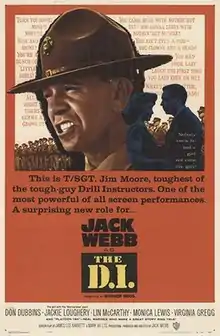The D.I.
The D.I. (1957) is a black-and-white military drama film starring, produced, and directed by Jack Webb.[2] The film was produced by Jack Webb's production company Mark VII Limited and distributed by Warner Bros.[3]
| The D.I. | |
|---|---|
 Theatrical release poster | |
| Directed by | Jack Webb |
| Produced by | Jack Webb |
| Written by | James Lee Barrett |
| Starring | Jack Webb Jackie Loughery Don Dubbins Lin McCarthy Monica Lewis |
| Music by | David Buttolph |
| Cinematography | Edward Colman |
| Edited by | Robert M. Leeds |
Production company | |
| Distributed by | Warner Bros. |
Release date |
|
Running time | 106 minutes |
| Country | United States |
| Language | English |
| Box office | $2.5 million (rentals)[1] |
Webb's co-star is his future wife Jackie Loughery, a former Miss USA.
The film was the first screenplay by screenwriter James Lee Barrett and was based on his teleplay The Murder of a Sand Flea.[4] Barrett had been on Parris Island as a Marine recruit in 1950.[5][6]
Plot
Technical Sergeant Jim Moore, a strict Drill Instructor on Parris Island, is charged with training recruit Owens, who seemingly has what it takes to become a Marine, but inexplicably caves when the pressure is on. His own reputation now on the line, Moore is convinced he can make Owens into a Marine and pushes him harder, but he continues to falter and very nearly deserts. His commander, Captain Anderson, gives Moore three more days to do something about Owens.
After a discussion with Moore and Anderson, during which Owens reveals that his two older brothers were both Marines killed in action in Korea, Anderson is ready to let Owens go, but an surprise visit from Owens's mother further reveals that his father was a Marine Captain and company commander lost during the Marshall Islands invasion in World War II. She admits she mistakenly coddled her only remaining son and begs Anderson not to discharge him, saying that he will never amount to anything if he doesn't make the grade; she tells Moore that her son can handle whatever he dishes out and to keep on him until he finally breaks through his problem when he starts grinning. Anderson calls Owens to his office, and tears up his discharge papers in front of him. Mentally, Owens grins and busts through, and is well on his way to becoming a Marine.
Cast
- Jack Webb as Technical Sergeant Jim Moore
- Don Dubbins as Private Owens
- Lin McCarthy as Captain Anderson
- Jackie Loughery as Annie
- Virginia Gregg as Mrs. Owens
Actual Marines, including actual drill instructors, were used in the cast as recruits, and those with speaking parts were given proper recognition in the closing credits:
- CPL Lawrence Windsor, Jr. as Private Severeign
- PFC Gordon Seiple as Private Carver
- PVT Douglas Wilson as Private Franklin
- CPL Charles Golden as Private Labarsky
- PFC John Ahern as Private Casto
- SGT Joseph Holmes as Private Madison
- SGT Peter O'Neill as Private Rodriguez
- PVT William Smith as Private McKinley
- TSGT Charles Love as "Hillbilly"
- SGT Paul Prutzman, Jr. as Sergeant Braver
Production
Following the Ribbon Creek incident that took place at Parris Island on the night of April 8, 1956, the Marine Corps was deluged with requests from various producers to make films exploiting the incident. Unlike many producers seeking to highlight Marine Corps brutality, Jack Webb based his film treatment on a teleplay by former Marine James Lee Barrett The Murder of a Sand Flea broadcast on the Kraft Television Theatre on 10 October 1956[7] with Lin McCarthy repeating his role. As the screenplay made no mention of the incident of Ribbon Creek and gave a positive view of the Marine Corps, the Marines enthusiastically cooperated with Webb providing many technical advisers and actual Marines [8] to appear in the film as Marines.[9] Barrett's screenplay expanded the story by introducing subplots of Moore having a romance with a local shop girl (played by Webb's future wife Jackie Loughery) and having Owens' mother (Virginia Gregg) make a trip to the Marine Corps Recruit Depot to beg the Corps to keep her son in order to make a man out of him. Portions of the film were shot at Camp Pendleton, California. The film premiered at Parris Island in May 1957 and was shown during the training of Marine Corps Drill Instructors. Webb's Drill Instructor neither used profanity or physically struck his recruits.[10] Singer Monica Lewis provided a musical interlude, performing the provocative song "(If'n You Don't) Somebody Else Will", backed by the Ray Conniff orchestra and chorus, which was released as a single by Columbia Records.
See also
References
- "Top Grosses of 1957", Variety, 8 January 1958, pg 30.
- "The D.I." The New York Times. Retrieved 2010-10-04.
- "The D.I." TCM. Retrieved 2010-10-03.
- Hayde, Michael J. (2001). My Name's Friday (1957). ISBN 9781581821901. Retrieved 2010-10-03.
- Books.google.com.au
- We...the Marines: [1] Anonymous. Leatherneck Quantico Vol. 53, Iss. 10, (Oct 1970): 72-75.
- IMDb
- Alvarez, Eugene (2007). Parris Island: Once a Recruit, Always a Marine. Charleston, SC: The History Press. p. 106. ISBN 978-1-59629-292-5.
- Stevens, John C. (2007). Court-Martial at Parris Island: The Ribbon Creek Incident. Columbia: University of South Carolina Press. p. 64. ISBN 978-1-55750-814-0.
- Smith, Larry (2007). The Few and the Proud: Marine Corps Drill Instructors in Their Own Words. New York: W. W. Norton. ISBN 978-0-393-32992-6.
External links
| Wikiquote has quotations related to: The D.I. |